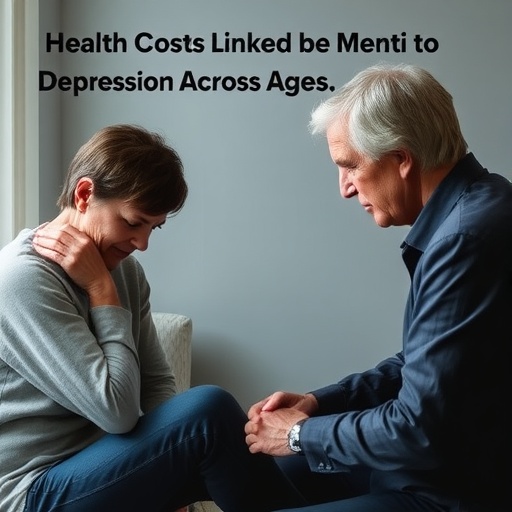In a groundbreaking new study published in BMC Psychiatry, researchers have unveiled compelling evidence linking household catastrophic health expenditure (CHE) with increased depressive mood among both adults and children/adolescents in China. This extensive population-based panel study not only broadens the scientific understanding of how financial health shocks impact mental well-being but also underscores the urgency for comprehensive policy interventions aimed at mental health support and health insurance coverage expansion.
Catastrophic health expenditure refers to medical expenses that consume a significant portion of a household’s income, causing financial distress or impoverishment. Although earlier investigations have hinted at the psychological burden associated with CHE, this novel analysis breaks new ground by including younger populations—children and adolescents—who are often overlooked in mental health research linked to economic stressors.
The researchers tapped into the rich dataset provided by the China Family Panel Studies (CFPS), which surveyed Chinese residents over multiple waves in 2016, 2018, and 2020. Focusing on individuals aged 10 years and above, the study meticulously assessed the correlation between CHE events and depressive mood symptoms, employing sophisticated multilevel random effects multivariate logistic regression models. This approach allowed the team to control for a range of confounding factors, enhancing the robustness and reliability of the findings.
Statistical analyses revealed that approximately 15% of adults and 12.61% of children and adolescents experienced catastrophic health expenditures during the study period. Importantly, these financial shocks were associated with a significant increase in the odds of depressive mood—34% higher risk in adults and an even more pronounced 48% increase in children and adolescents. The findings persisted across various subgroup analyses, emphasizing the pervasive nature of the psychological consequences brought on by financial hardship related to healthcare costs.
The investigation further delved into the protective effect of health insurance, uncovering that individuals insured by either urban or rural health schemes exhibited decreased odds of experiencing depressive mood. This observation highlights the critical role that comprehensive health insurance coverage plays not only in reducing out-of-pocket costs but also in mitigating the mental health burden that often accompanies economic hardship.
By incorporating both adults and youth in their analysis, the researchers shed light on the intergenerational impact of CHE. Previous studies predominantly focused on middle-aged and elderly populations, but these new insights reveal that children and adolescents are equally vulnerable to the mental health ramifications of household financial stress. This underscores the importance of family-centered interventions that address the psychological needs of all household members affected by healthcare-related economic strain.
The study’s methodological rigor is noteworthy. Using panel data models allowed for the consideration of repeated observations over time, enhancing causal inference regarding the relationship between CHE and depression. Adjustments for sociodemographic variables, insurance status, and other potential confounders add further depth to the conclusions, making a strong case for targeted health and social policies.
These findings bear significant implications for public health strategy across China and other countries grappling with similar issues. The high prevalence of CHE-induced depressive symptoms calls for urgent expansion of health insurance schemes, including rural and underserved populations, to provide financial risk protection. Additionally, incorporating mental health services within primary healthcare and community settings could be pivotal in addressing this dual burden.
Beyond insurance reform, the authors advocate for the implementation of family-based mental health resources and financial literacy programs. By empowering families with knowledge and support, these strategies could alleviate the psychological toll of navigating complex healthcare expenses, thereby enhancing resilience and well-being across generations.
The study also adds to the growing body of evidence urging health systems to consider economic factors as integral determinants of mental health. Rather than viewing depressive mood purely as an individual or biomedical issue, the research stresses the need to address social determinants such as financial hardship, which have profound implications for mental illness prevalence and prognosis.
This population-level study exemplifies the power of longitudinal data in unpacking the intricate relationships between economic status, health expenditure, and psychological outcomes. It offers a valuable blueprint for future research in global mental health, highlighting the necessity of multifaceted approaches that blend economic policies with mental health interventions.
In conclusion, the research marks a significant advance in our understanding of how catastrophic health expenditures compromise mental health among diverse age groups in China. The evidence demands a multipronged response encompassing insurance coverage expansion, mental health service provision, and educational initiatives aimed at financial resilience. As countries strive to achieve universal health coverage and improve mental health outcomes, such findings underscore the interlinked nature of financial security and psychological well-being.
Subject of Research: Household catastrophic health expenditure and its association with depressive mood among Chinese adults, children, and adolescents.
Article Title: Household catastrophic health expenditure and depressive mood among Chinese adults, children, and adolescents: a population-based panel study
Article References:
Li, S., Fang, K., Zhang, Y. et al. Household catastrophic health expenditure and depressive mood among Chinese adults, children, and adolescents: a population-based panel study. BMC Psychiatry 25, 353 (2025). https://doi.org/10.1186/s12888-025-06788-2
Image Credits: AI Generated




